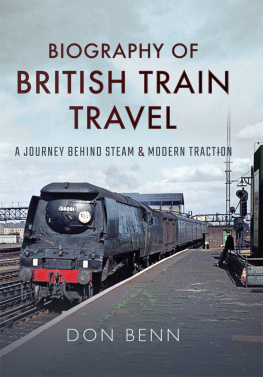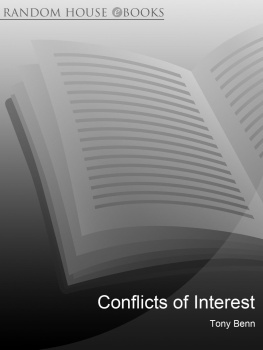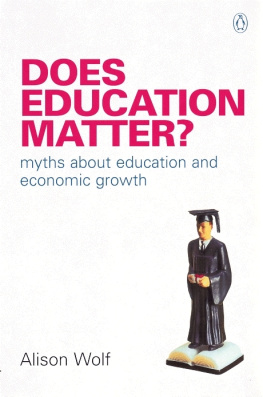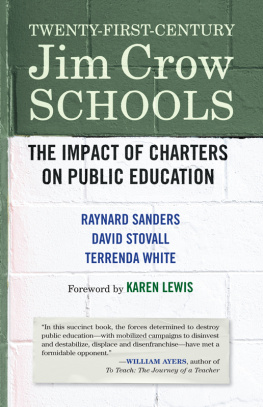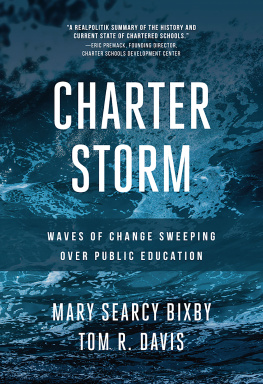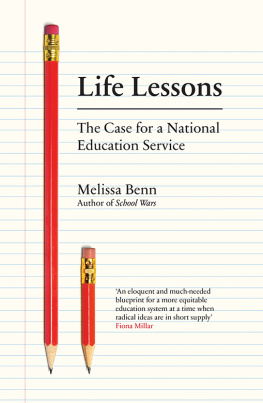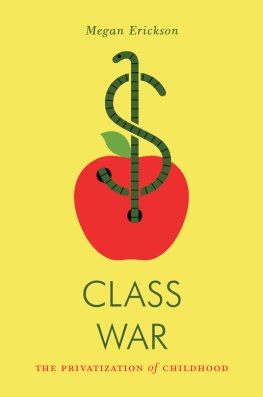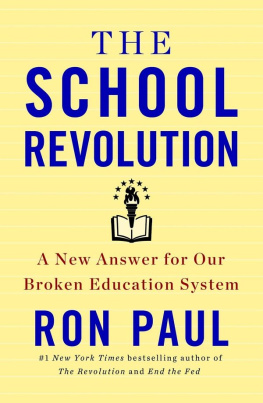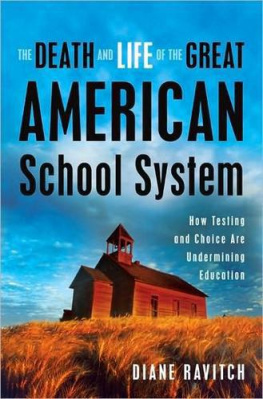
SCHOOL WARS
THE BATTLE FOR
BRITAINS EDUCATION
MELISSA BENN

For Dadthe great encourager
Contents
Non-fiction
Death in the City (with Ken Worpole)
Madonna and Child
A Tribute to Caroline Benn: Education and Democracy
(co-edited with Clyde Chitty)
Novels
Public Lives
One of Us
In the mid 1990s, my partner and I made the unremarkable decision, as do thousands of parents every year throughout the UK, to send our children to local schools. Living in an inner-city area, where the question of education is often so fraught, while we did not unduly agonise as parents, we did make a conscious and considered choice based on a deeply held belief in what constitutes a good education. Of course, it is important that our daughters should learn and do well, but we also wanted them to discover how to take their place in the real world. In the lyrical words of pioneer educationalist Alex Bloom, we wanted them to experience just relationships with persons.
We were lucky in many ways. Our elder daughter started school at the local primary soon after New Labour came to power; her sister joined her there two years later. In their younger years, then, they were Blairs children, benefiting from the visible public passion of an eager new government with a clear mandate to improve the nations schoolsand, in time, generous increases in education funding. Primary-school class sizes were kept under thirty; there was renewed emphasis on literacy and numeracy. It was a time of relative economic buoyancy and cultural openness, and, looking back, one of several missed political opportunitieswhen a popular young government with an impressive majority might have made some important reforms, that not only improved our schools, but expanded the possibilities of comprehensive education itself. Sadly, the political story was to unfold in a different direction.
We discovered then, as so many parents do, that state education is in much better shape than a hostile press, TV and radio will usually allow. Our local primary school was filled with exceptionally committed and hard-working teachers. The school put appropriate emphasis on the building blocksreading, writing and mathsbut there was also plenty of history, geography, science, art and design project work, and a wide range of extra-curricular activities including drama and music and many out-of-school day and residential visits. An on-site refugee centrethe only one of its kind in the countrywhich worked hard to help migrant families integrate into both society and school, and a counselling service, The Place To Be, were just two examples of the thoughtful and realistic way that the school handled potential obstacles to learning amongst its pupils. Dozens of languages were spoken, and cultures represented, within the school community, and rich use was made of this unique facet of an urban primary like oursin Brent, North-West London, one of the most ethnically diverse areas in Europe.
Watching regular class performances and special assemblies in which children from an extraordinary spread of social, ethnic and religious backgrounds lined up shoulder to shoulder, it felt as if we had stumbled acrossor held the key to, at leastsome kind of practical utopia. I was moved by a profound sense of possibility, the honest belief that all our children could be educated together, successfully, the common good confirmed and extended by a mix of state resources, staff commitment, and parental and community engagement.
I had not reckoned on the fraught process of secondary transfer, in which parental ambitions and anxieties, particularly in inner-city areas, are so powerful. Going through this experiencetwiceand watching many parents endure it in the years since, has confirmed for me that schooling remains one of the key ways in which class identity is formed in modern Britain. It was striking how many of the middle class, happy to support all-in primary schools, departed from local comprehensive education at secondary level, and quite how desperately a few sought to secure, by whatever means lay open to them, the right school place for their child. Place is a particularly apposite noun here. After all, the word ranges in meaning from social station to locality, a suitable setting or occasion, high rank or status, and finally job, post or position .
This experience made me profoundly distrustful of the concept of parental choice, in all its varieties. To state the obvious: what choice can a family on a joint income of 20,000 or less exercise to apply for a school that charges 12,000 a yearbefore the inevitable add-onsnot to mention the difficulties a child might well face trying to integrate in a social environment where the majority of families can comfortably afford such fees? How many families even know of the existence of, let alone are able to access, the shadowy world of tutoring and exam preparation that powers children into the highly selective grammars (and private schools) thickly dotted around our major towns and cities?
State-funded faith schools are a particular provocation to many parents. Every year, one can comfortably second-guess which children will win a place at one of the more prestigious Anglican or Catholic schools, pupils selected on the occasionally dubious grounds of their parents long-held religious practice or their childrens artistic or musical aptitude, one of the criteria by which schools select a percentage of their pupils. Clearly, the higher-achieving of these schools are choosing families and pupils as much as the other way around, thus creating for themselves a highly favourable pupil mixwhat Professor Tim Brighouse would call a comprehensive plus intakeand in the process contributing to a small but crucial narrowing of true comprehensive intakes in many local schools. Enabling faith to be played as a school advantage card has been increasingly criticised, most recently by John Pritchard, Bishop of Oxford and Chair of the Church of Englands Board of Education, and it manifestly undermines the claims of these affiliated institutions to embody genuinely inclusive values.
* * *
Once again we chose the local community school, a brisk twenty-minute walk from our home. At the time, exam results were average, there were no rousing speeches about Oxbridge entrance, the school had no rugby team. Like so many comprehensives in inner-city areas, there was a far higher percentage of children on free school meals and children with special needs, and far fewer middle-class children, than lived in the surrounding area. But we admired and warmed to its friendly, open spirit, its determination to do well by every child and to keep improving. It looked like the London in which we live now, not a cosy recreation of the city I grew up in. There was a great deal of nervousness, and prejudice, among local parents but we decided to trust our instincts, helped by the fact that we knew a number of older children who had successfully made the transition. Several years on, our faith in something other than raw league tables, covert social snobbery and urban myth feels more than justified.
Yet despite their many strengths and successes, as well as their evident challenges, comprehensive schools like ours are routinely denigrated in the wider world. It may be bad luck, or a reflection of the tendency of national journalists to conduct research in locations easily reachable from their Central London offices, but over the past decade both our local primary and secondary schools have been subject to media sting operations. In the first case, an experienced Evening Standard reporter, Alex Renton, who had already written a highly praised undercover piece about what life was like at an NHS hospital, was looking around for an opportunity to write a similar expos on education, and pitched up at our local primary. Posing as someone interested in becoming a teacher, Renton was assigned to spend a week with a class of eight- and nine-year-olds. According to a subsequent report in the Guardian , Renton is a personable chap and the kids like him, as do the teachers. He notes that there are children with special needs, that there is a teacher shortage, that a classroom window is broken. On day three he observes a class of six- and seven-year-olds and remarks that disruptive children spread chaos around them. Next day he witnesses a session designed to deal with bullying in which a teacher coaxes children to understand inappropriate behaviour. Renton is also told about a boy who is suspected of having been a victim of sexual abuse. When Renton asked the class teacher, whose own daughter was at a private school, to speculate on the relative achievements of children in the two sectors, she intimated that the brightest children would rank somewhere nearer the middle in her daughters class.
Next page

